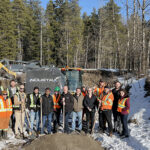Home »

City considering pilot relocation program
The City of Cranbrook would consider an urban deer relocation pilot program, but only if an outside wildlife agency or educational institution wishes to take it on.
City council March 5 voted to support Urban Deer Management Advisory Committee recommendations stemming from a review of two letters: one from Chris Hirn, owner of Urban Deer Relocators, regarding a proposal to relocate Cranbrook’s deer population and F.J. Hurtak, also regarding relocation of deer.
“Members (of the committee) discussed the option of recommending to council that staff draft a response to the two pieces of correspondence, indicating the city not oppose a relocation test project. However, the committee indicated in the response, it should be noted that the city, at the sole discretion of council, be prepared to provide financial assistance for an approved test relocation program up to the cost per animal incurred in the 2011 pilot cull project. The cost of the 2011 pilot cull project was $12,900 (an average cost of $516 per animal). Council currently has up to $15,000 set aside for any additional deer management initiatives in 2013. Any additional costs for professional supervision, GPS collars, transportation, and insurance would not be covered by the City of Cranbrook,” states the deer committee’s report to council.
Council voted five to one to approve the recommendations made in the deer committee report, with Coun. Gerry Warner opposed and Coun. Denise Pallesen was absent.
“The crux of it is – a pilot relocation of about a dozen deer,” remarked Mayor Wayne Stetski.
The approved deer committee report points out, “That relocation was one of several management options for deer identified by the province and that after reviewing the report and considering the experience gained in other jurisdictions, the Urban Deer Management Advisory Committee recommended that a pilot cull be carried out as part of the city’s overall deer management program.
“The city would be prepared to provide financial assistance for an approved test relocation program up to the cost per animal incurred for the 2011 cull. Anticipated additional costs for professional supervision, GPS collars, transportation, and insurance are beyond the City’s capabilities but may be within the scope of a research project conducted by an educational institution or recognized wildlife association.
“Any initiative involving wildlife management is subject to approval and permitting by the Ministry of the Forests, Lands and Natural Resource Operations. If a third party wishes to investigate the feasibility of a pilot relocation program on behalf of a recognized organization, it is recommended that a detailed proposal be developed in consultation with a professional wildlife biologist for review with appropriate ministry staff.”
Warner said he doesn’t believe a relocation program would be feasible.
“As far as it goes, the jury has deliberated. It’s a problem all over B.C. Maybe if we could get deer down to a manageable level but I don’t think it’s feasible. I really think we’ve gone down this road far enough,” he said, pointing out that each radio collar that would be fitted on a relocated deer costs $1,000. He also questioned as to where the deer would be relocated.
Coun. Bob Whetham said such a program wouldn’t cost the city any more money, as long as an outside agency conducted the study at their expense.
“Other people feel strongly that other options need exploring,” he said.
Coun. Angus Davis said he favours culling deer, “which have caused havoc. If some child gets hurt… we’ve really sold ourselves short.”
He added that he had a clover trap in his yard during Cranbrook’s 25-deer cull last fall, with three animals being trapped and euthanized. “It was done quickly and humanely,” he said.
“I’m willing to give it an opportunity to happen,” said Mayor Wayne Stetski.
In its vote, council also directed staff to amend the Urban Deer Management Advisory Committee’s Terms of Reference “to remove the provision to allow the Ministry of Forest, Land and Natural Resource Operations committee representative to vote, specifically around the committee approving any future deer management recommendations to council for consideration,” stated the report, citing a perceived conflict-of-interest.
“Any response should also state that an initiative involving wildlife management is subject to approval and permitting by the Ministry of Forests, Lands and Natural Resource Operations and that a detailed proposal be developed in consultation with a professional wildlife biologist for review with appropriate ministry staff.
Ian Cobb/e-KNOW







